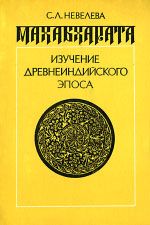|
|
| |

|

|
Neveleva S. Mahabharata. A Study of the Early Indian Epos / Ed. by Dr G.A.Zograph. М.: «Наука», 1991. 228 p.
SUMMARY
The book recapitulates a century and a half of studying in this country and abroad of this major monument of Sanskrit epic literature. The study's major focus is on theoretic conclusions made by Soviet Sanskritologists carrying on the tradition of modern folklore and of epic research abroad.
The foreword gives an overview of the integrating role of epos in India's traditional cultural legacy, the part epic works have been having in literary and cultural evolution in the region, as well as of the chief areas of investigation. The section, On the History of Studies of Early Indian Epos, highlights three stages in the history of science — pre-critical (from the late 18th century to the 1840s), critical (until the 1960s), and the contemporary. Each stage is noted for its very special problems in dealing with ancient epics. Both analytic and synthetic schools contributed substantively to elucidating the early Indian epic genre, the former by untangling its wide-ranging substance and the latter by unraveling its composition and style cohesion. The section, On Editions and Translations of Indian Epic Monuments, bears on the specifics an area of study which is absolutely vital to appreciating the Mahabharata and Ramayana. The section, Problems of Mahabharata Genesis, offers historico-typological guidelines to uncover the oral-folklore character of the origin of early Indian epos, its ksatria-warrior purveyors, subsequent divisions among the narrators, as well as Mahabharata's evolution from a heroic epos to a philosophic-didactic work through Brahmanic interpretation. Besides critically exploring some non-historical versions of plot, the section Mahabharata and History considers certain conclusions concerning the historicity of Mahabharata's emergence: Ya. Vassilkov argues that it was a drawn-out ethno-cultural stand-off among tribes rather than dynastic strife that oraginated its plot.
The section, Typological Aspects of Early Indian Epos, is mainly concerned with P. Grintser's theory on the compositional archetype of both Mahabharata and Ramayana in the dragon-fighting myth being transformed into the calendaric by the early agricultural civilizations. The section, Hindu Mythology and Its Epic Pantheon, is a thumbnail sketch of the foremost mythological personages vital to the epic vision of the world and, natu-
rally, to epic poetics. The section, The Ethnographical Substzatum of the Mahabharata, considers a major folklore theory as applied to Indian epos, which, like any other, constitutes a generalized-typified and idealized version of its concrete antecedents; this section is also a methodological introduction to the closing section, Mahabharata's Poetics. This section has two parts: the first ranges over formal-semantic attributes and usage of chief imagery elements like epithets, similes, and metaphores; the second deals with the interlacing model-motifs: the motif-situation, speech, transposition-transformation, action, and description, as examined by B. Putilov, in the various texts — compositional incorporation, as in the case of the epic lineages, in a separate book (Aranyakaparva), and on the compositional borderline of two adjacent books.
This book might hopefully give bearings to a reader interested in the history of literature and in the complex problems of epic studies, specifically those of the multi-faceted picture of early Indian epos and its poetic environment.
 PDF-files PDF-files
Аннотация, Предисловие, Summary, Содержание
Keywords
Indian epos
Mahabharata
|
|
|
|
Random news: Announcements |
|
A conference dedicated to the 90th anniversary of Anatoliy P. Terentiev-Katansky (1934‒1998) will be held at the IOM, RAS on November 6, 2024. The conference program is now available. |
|
Read more...
|
|
|
|
|

